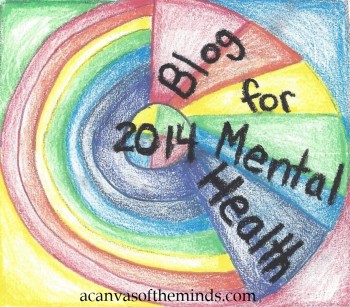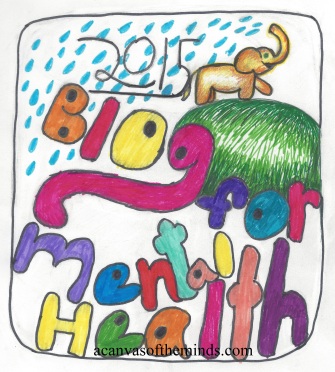Yesterday someone asked me to write a 1,000 word essay on my personal experience with mental illness. After I wrote it, I realized that I have never told my story to anyone. I have now added it to the menu on my blog, but I thought I’d include it in a post, too. Here it is:
I come from a family with a history of depression and anxiety. My dad and two of my brothers have bipolar disorder. My mom has an undiagnosed anxiety disorder. And I struggle with both mood and anxiety disorders. Because of this familiarity with mental illness, I played the helping role in my family for many years before I chose my profession. So becoming a clinical psychologist almost felt like a calling rather than a choice.
I first became depressed in high school. It’s hard to separate the angst of adolescence from clinical depression, but I had thoughts of suicide by the age of 15, so I’ll say that it started then. At that time, my diagnosis would have been dysthymic disorder—a more chronic, lower grade version of depression.
When I left for college at 18, I crossed over to major depression. However, I didn’t do anything about it for a year. At 19, I had my first therapy session with a psychiatrist who confirmed my diagnosis of depression. At the time, that was enough to make me feel better—to have someone tell me that what I was going through was real.
So I didn’t follow up with therapy until after I graduated from college, when I was 22. I can’t say I thought that therapist was particularly helpful. He never told me his opinion on anything, never gave me homework, never offered me another way to look at things.
The 3rd time I went to therapy was with my boyfriend right before we got engaged. I was 25 at the time. It was clear that she thought that our relationship problems were because of my depression and suggested that I go on meds, which really pissed me off. We didn’t see her for very long.
Still, she planted the seed of meds in my mind, and I started a trial of antidepressants about 6 years after she suggested it. And it did help. But after a year and half, I stopped taking them because I didn’t want to have to rely on meds to feel “normal.” Then I started them again a few years later when my husband and I started talking about separation.
I also went back to therapy. And she is the therapist who I have seen on and off for 13 years now. Her unconditional acceptance and belief in me, over time, has allowed me to accept and believe in myself. Still, I would see her for as little as I could get away with until I became functional, because I didn’t think I deserved to take up more of her time.
My 2nd major depressive episode happened almost 6 years ago when I was 40. I had stopped taking my meds again, and about 3 months later, I got depressed again. And it was even worse than the first time. It probably took me about 9 months to recover completely.
This time I was not able to just restart my meds and return to normal, so I saw a psychiatrist for the second time. Surprisingly, he was more concerned about things like light therapy, sleep hygiene, and supplements (Omega-3, NAC, Folic Acid) than he was about antidepressants. But I had to take those, too. He also added Ativan, because my anxiety had worsened, and lamotrigine for bipolar depression, because of my family history and my hypomanic episodes.
It was difficult to accept that for the rest of my life I would be on a regimen that requires an AM and PM pill box. But I had suffered so much through this last depressive episode that I got over it and was thankful to pharmaceutical companies for coming up with drugs that could make me feel like myself again.
Since that last depressive episode, I have gotten much better at taking care of myself. Mental health professionals have a tendency to put other people’s needs first, usually to their own detriment. I guess it’s sort of like how physicians make terrible patients. However, my determination to avoid a 3rd major depressive episode has motivated me to make my well-being a priority.
I have never shared this detailed of an account of my mental health history with anyone because I was ashamed of my depression. I felt like a failure. I was supposed to have everything under control, but sometimes I was struggling more than my clients were. But then a few years ago I decided to write a book about self-acceptance where I make use of both my personal and professional experience.
I decided to start with a mental health blog where I would be open and honest about all of the things that I ordinarily try to hide as a way to demonstrate how to practice self-acceptance. Because it’s that hard to do. Even when you know what you’re supposed to do.
Surprisingly, readers are more interested in my personal experience than my expertise. Although I think it helps them to know that I am a psychologist, because it’s further proof that everyone struggles. Being an expert doesn’t make you exempt from suffering. From avoiding help. From resisting treatment. It is all a process that slowly improves with time. And as I blog and get feedback from readers, I become increasingly more comfortable with being me.
So even though I started this blog to help other people, it has turned out to be the best gift I have ever given to myself.






Thanks for your post. I’m a retired social worker who suffered deep clinical depression for years before i got help. My mother was depressed and alcoholic, I have a grandson who is really struggling because he is bipolar.
Always nice to find a friend. I looked everywhere early in recovery (20 years ago now) to find any account of what it was really like in the dark and couldn’t find one, so I think it’s vitally important to speak about our experiences
LikeLiked by 1 person
Thanks for your feedback. I think it’s even harder to find mental health professionals talk about their struggles with mental illness.
LikeLike
I agree. And it’s exactly that that makes treatment fail so often. If I look at you and why programs like AA are so effective. People who have been there and overcome are in a much better place to help others cope. We know first had how little platitudes help when we are overtaken by emotion and can’t see our hand in front of our fce so to speak..
LikeLiked by 1 person
I know, right? In my training they thought it was a disadvantage to have experience with the problem you were trying to treat. Like it meant you couldn’t be that effective because you were working on your own issues.
LikeLike
I wanted to thank you for sharing your story. In my teen years I had bad experiences with doctors due to another health problem and that soured my view on any healthcare / social workers, to the point where I’d get panic attacks before and sometimes even during visits. I avoided treating my mental health precisely because of this prevailing fear and aversion.
By sharing your struggles I’m able to build up my faith. So many times I thought my healthcare providers (in the mental health department) were so far from me, what I feel — that their understanding of my problems were just learned from textbooks. I didn’t see the human part of them until last year.
I’ve learned much from your post. I’m glad I found it. I’m wishing you all the very best. 🙂
LikeLiked by 1 person
Thanks Eve! I appreciate your feedback. I’m sorry that has been your experience with people in health care. Sometimes it has been mine, too. The one positive thing about all those depressive episodes is that they helped me to have more empathy for the suffering of others.
LikeLike
I am always so in awe of those who can be so candid about their mental illness. Unlike physical ones, for those who don’t suffer from them, it’s sometimes hard to understand what happens which then creates stygma, sending the sufferers deeper into their solitude. Your process of becoming a therapist yourself is probably unusual. I wonder if it has helped you by understanding in greater detail how depression works.
LikeLiked by 1 person
Thanks for your feedback. It has helped me a great deal. I remember during that last depressive episode when I was lying on the couch and couldn’t move, how one of my clients said that they couldn’t get out of bed the previous week. I had not imagined what that must have felt like for them until I was doing it myself.
LikeLike
Pingback: The Gift of Compassion | Normal in Training
Pingback: Suggestion Saturday: January 24, 2015 | On The Other Hand
Pingback: 2015 Blog for Mental Health Project | Normal in Training
Hi, I found your blog through the 2015 BMHF roll. I look forward to reading more 🙂
LikeLiked by 1 person
Thanks for finding me! 😀
LikeLiked by 1 person
Thank you so much for sharing. The more people who do, the less it will be a stigma and the more people will get help.
LikeLiked by 1 person
Thanks Joy!
LikeLike